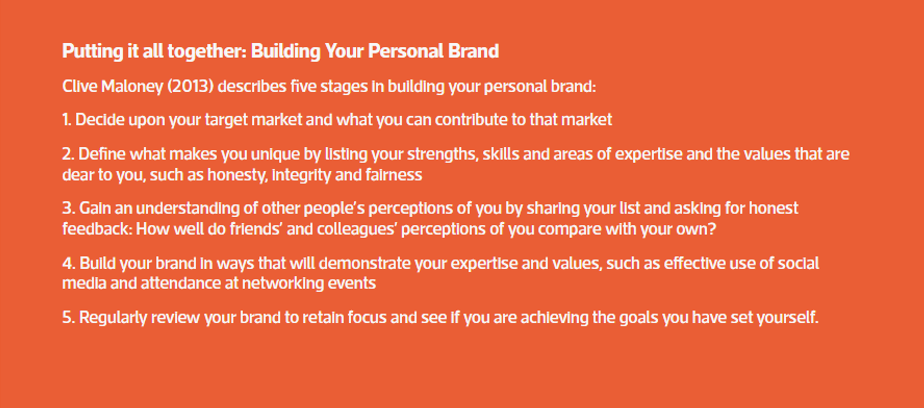What is a ‘Brand’?
A brand is:
- Words
- Sign
- Symbol
- Unique design
- Trademark
- Name
or a combination of these. Its purpose is to distinguish a product or manufacturer from others in the market and it gives the organisation a unique identity.
A key priority in your organisation’s branding process is for the brand to reflect the values and spirit of its culture, its image and unique vision. What is it setting out to do, to be?
The rapid growth in the use of social media has made it an increasingly important method of communication, and of creating an impression.
Public, employee and customer perceptions are influenced by an organisation’s branding activity, and, over time, the brand becomes associated with a level of credibility, quality and satisfaction in people’s minds. Anything an organisation does to contradict its brand values will undermine the brand.
Personal Brand
In today’s digital age, branding is not restricted to organisations; practically everyone has a personal brand, whether they deliberately set out to cultivate one or not. Colleagues and team members build a perception of you from working with you, and your very presence, whether in the workplace or on-line, creates an impression on people. Try putting your name into a search engine and see what comes up; you may be surprised at the results.
Today’s leaders need to think of themselves as brands, and to develop their personal brands so that their name becomes associated with, for example, particular qualities, expertise, or interests.
Personal Brand Management
Your personal brand is your unique identity, or image, regarded as an asset. Personal branding is the ongoing process of establishing your image or impression in the mind of others; your team members, your colleagues, your boss and your wider professional network. (Carson, 2016)

Managing your personal brand does require time and energy, and your brand can suffer negative consequences if it is not consistent or kept up-to-date.
You are the custodian – consciously or not – of your own image. You have the choice of whether to cultivate it to your advantage, helping to position yourself where you want to be, personally and professionally, or to leave it be created for you. Your brand should reflect the person you are and the person you try to be, and what you want to present to others. You want to appear human, as well as a dedicated professional.
People will only recognise your brand after they see it several times. Think about what impression you want to communicate and then make sure you manage it carefully and regularly, at work, on-line, in your personal and your professional life. Your personal brand is about being the best of yourself, so you need to communicate that.
Personal brand management is the ongoing process of establishing, reviewing, evaluating and acting upon a specified image or impression in the mind of others. It is a means by which people remember you.
Being ‘on brand
Having clearly defined your personal brand, every way you behave and interact, everything you do, or communicate, or anything else that represents you, needs to match your personal brand description. If your actual self matches your personal brand, you are said to be ‘on brand’.
You also need to be aware of your corporate brand messaging. As a leader, it is important that both you and your team are ‘on brand’ or ‘on message’ with your organisation’s brand. All the contact you have with external and internal customers, colleagues and stakeholders needs to also reflect your organisation’s brand, as well as your own. Of course, this will be much easier if there is a strong connection between your personal brand and your organisation’s brand.
Credibility and Reputation
Credibility is a complex quality that influences your willingness to believe in what a person says or does. It is based on the person’s honesty, knowledge and good intentions. Your credibility is closely linked to your reputation and is essential to it. Reputation refers to the beliefs or opinions on what somebody, or something, is like, based upon what has happened in the past. Your credibility and reputation are reflected in the impression others have of you – your ‘brand’. How can you build credibility?
To build credibility as a leader you need to:
- Be consistent especially in words, behaviours and decisions. Your actions should align with your values
- Be honest. Even if you are unable to tell the whole truth due to need for confidentiality
- Be responsive. Make contact personally and use technology appropriately
- Communicate expertise. Show a deep understanding and knowledge of your subject, product, process or customer/ user needs etc
- Goodness. Communicate that you have the best interests of others in mind
- Be trustworthy. Always do what you say - Walk the talk
“As a leader, it’s important to define your leadership style and embody a keen awareness of what you are doing, why, and the impact of that work. Leaders who actively design their brand are able to successfully manage career progressions, learn and share with colleagues, and maximize opportunities that align with their purpose.” Greenwade, L. (2018)

Grow your team's skills, elevate your brand reputation and more, with our corporate solution.
References
Carson, M. (2016). Introduction To Personal Branding: Ten Steps Toward A New Professional You, Delightful Communications
Castrillon, C. (2019) Why Personal Branding Is More Important Than Ever www.forbes.com/sites/carolinecastrillon/2019/02/12/why-personal-branding-is-more-important-than-ever/#3b7b59f72408
Greenwade, L. (2018). The Importance Of Crafting A Powerful Personal Brand https://www.forbes.com/sites/forbescoachescouncil/2018/06/08/the-importance-of-crafting-a-powerful-personal-brand/
Holloway, J. (2017). Personal Branding for Brits - 4th Edition: How to promote yourself, raise your profile and get ahead...without sounding like an idiot 4th Ed. Publ. Spark Ltd. N. Yorks., UK
Maloney, C. (2013). 5 Steps to Building Your Personal Brand In: Clive Maloney’s www.getrealaboutbusiness.com/5-steps-to-building-your-personal-brand/
How would you rate your personal brand? Test yourself with our Scorecard.
If you’re a member, you can test yourself on Personal Branding and see if you meet the standard.
Spotlights
Further Resources
From the blog





